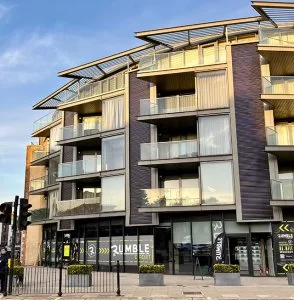Landlord and Tenant Solicitors
Residential Landlord and Tenant Disputes
Even when both parties have the best intentions, disputes can arise between landlords and tenants. Our expert lawyers can help you reach a cost-effective outcome if your tenancy is not going to plan.
Table of Contents
What are landlord/tenant disputes?
Disputes between landlords and tenants are often the result of rent arrears but can also occur whenever one party breaches the terms of the tenancy agreement. That might be a landlord failing to maintain the property or unlawfully entering the premises without providing proper notice. Or it could be a tenant causing damage or subletting without the landlord’s consent.
Residential landlords must also comply with a wide range of statutory requirements. These include correctly protecting a tenancy deposit and returning it at the end of the tenancy, and carrying out gas safety checks each year. If the landlord does not meet their statutory requirements, this can also lead to disputes with the tenant.
There is a lot at stake for both parties. Emotions can run high in tenancy disputes and sometimes things are said that both parties later regret.
Osbornes’ highly experienced landlord and tenant solicitors can help take the pressure off. Acting for both landlords and tenants, we’ll guide you through the key decisions you have to make to resolve disputes as quickly and cost-effectively as possible.
Helping landlords deal with problem tenants
Recovering rent arrears
Most landlord and tenant disputes occur because of rent arrears. The tenant may have missed payments because they legitimately cannot afford to pay, or they could be refusing to pay in retaliation for perceived failures by the landlord.
Whatever the circumstances, a frank solicitor’s letter is often enough to secure payment, perhaps through a payment plan. If the tenant fails to cooperate, our landlord and tenant solicitors can advise you on the best course of action. That might involve taking action against a guarantor, taking the tenant to court, or serving a notice of eviction.
We can also instruct trace agents to locate tenants who have left without paying their rent.
The tenant may submit a defence or apply for Breathing Space, which is a government respite scheme allowing some tenants to postpone action for 60 days while they work out how to pay their debts. If either of these happens, we’ll help you navigate the next steps.
Damage and dilapidations
Tenants generally are required to keep the property in a good state of repair and return it to the landlord in the same condition as when they moved in. If your tenant does not fulfil their obligations, this could be classified as a breach of the tenancy agreement. Examples of issues that can lead to dilapidation claims include broken windows, damage to walls, stained carpets and water damage.
The cost of making the repairs will usually be deducted from the tenant’s deposit. If this does not cover the cost, then our landlord and tenant solicitors for tenancy disputes can help you recover any additional amounts. You may also be able to charge the tenant for lost rent whilst the repairs are carried out.
Breach of the tenancy agreement
A landlord has a right of action against the tenant if they breach any part of the tenancy. Besides rent arrears and property damage, common breaches include:
- Keeping pets
- Subletting the property to another person
- Non-payment of service charges
- Anti-social behaviour / disputes with neighbours (e.g. harassment, rubbish piling up)
- Failing to allow access for essential repairs
A well-drafted tenancy agreement goes a long way to helping both parties clearly understand their rights and legal obligations. If matters do escalate, our landlord and tenant disputes solicitors can help resolve matters through negotiation or mediation in the first instance. These are the fastest and most cost-effective ways of settling the issue.
If an amicable resolution cannot be reached, we can file a claim to recover rent or damages. These claims can often be included in a possession claim to evict the tenant.
Possession proceedings
There is a strict legal process to follow for evicting a tenant. Landlords must follow this process carefully or the tenant may be able to bring a claim for unlawful eviction.
For assured shorthold tenancies, the process is set out in Section 8 or Section 21 of the Housing Act 1988. Section 8 is used where the tenant is in breach of the tenancy agreement, most commonly by failing to pay rent. Section 21 is a no-fault eviction. It is used when the fixed term of the tenancy has come to an end and the landlord simply wants possession back. Landlords do not need a reason to evict the tenant with a Section 21 notice, and they are not always heard in Court.
Section 21 is currently under review and may cease to exist as part of the Renters Reform Bill.
We offer a full service for possession proceedings, from deciding the best approach to take and serving the correct notice, through to issuing the Court claim and representing you at the Court hearing. We also advise on alternative practical solutions that could help you take the property back from the tenant on a mutually agreeable footing.
Helping tenants with their rights
Tenancy disputes can be especially stressful for tenants who may worry they will be left without a home. Our landlord and tenant disputes solicitors can advise you of your rights and ensure you are treated fairly.
Unlawful eviction or harassment
It is a criminal offence for landlords to evict tenants without following the correct legal process. Changing locks, taking the tenant’s possessions or preventing a tenant from entering their home are all examples of illegal eviction tactics.
If you believe your landlord is trying to force you to move without lawful reason (e.g. they are retaliating against a repair request) or by using unlawful means, contact our landlord and tenant solicitors immediately. We will act swiftly and decisively to protect your rights and seek compensation if necessary.
Security deposit disputes
Tenants have rights to have security deposits returned to them promptly under Deposit Protection schemes, but landlords are entitled to keep some or all of the deposit if there are rent arrears, unpaid bills, or damage to the property.
Disputes around security deposits often come down to a disagreement about what constitutes damage (which the tenant is responsible for) and normal wear and tear (which landlords must cover).
Our solicitors can help you gather evidence and make a persuasive case to the landlord or through a fully independent arbitration scheme. The result could be a full or partial refund of your money.
Disrepair at the property
Landlords are legally obliged to:
- Keep the exterior of their property in good repair (roof, walls, gutters etc).
- Keep gas, electricity and water systems in proper working order and repair (baths, toilets, heaters, water tanks, etc).
- Respond to requests for repairs in a reasonable time.
- Give 24 hours’ notice of visits to make repairs.
There may be other disrepair obligations as well, depending on the terms of the tenancy agreement.
If a landlord fails to meet their responsibilities, the tenant can take them to Court. The Court can order a landlord to rectify an issue and to pay compensation to their tenant. That might include the cost of damage to your furniture caused by substandard living conditions or financial losses if, for example, your electricity bill went up because you had no working gas boiler.
We have a strong track record of negotiating with landlords to ensure repairs are taken care of as quickly as possible without having to resort to legal action. Should this be necessary, we will guide you through the process and help you obtain an order for repairs (or compensation) from the Court or tribunal if applicable.
Other landlord and tenant disputes services
We can also help you with:
- Breaches of tenancy agreements
- Evicting squatters
- Disposing of tenant belongings that have been left behind
- Rent increases
- Service charge disputes
- Claims for excessive fees by a landlord or managing agent
- Disputes about licences for houses in multiple occupation
How we can help
Most landlords and tenants want to continue their relationship on good terms. Our expert property disputes solicitors can help you do this, and do it quickly and informally, without involving the Courts. If litigation is necessary, you can be sure that we will prepare a strong case on your behalf.
For over 40 years, Osbornes has provided an incredibly personal service to private landlords and tenants across England and Wales. Clients work with us because we are friendly, approachable and give easy-to-understand legal advice. We are able to offer fixed fees for many residential tenancy disputes so you can budget carefully for your legal fees.
To learn more about our residential tenancy disputes service, call Osbornes’ dedicated landlord and tenant solicitors by:
- Filling in our online enquiry form; or
- Calling us on 020 7485 8811
Shilpa really helped us take charge of the situation and helped resolve this property dispute. I would not hesitate to recommend her or the team to anyone in a similar situation.
On first meeting Shilpa I was sure that she understood immediately my requirements, and was sympathetic both to my financial restraints and my emotional state. She achieved everything I asked of her and proved to be invaluable, professional and efficient
At every step Shilpa alleviated any concerns and stresses we had. Always fast to respond, always professional and super knowledgeable.
Shilpa has helped us through some key property litigation matters (residential and commercial) since 2014 and has delivered on every occasion. One particular issue had kept us in a state of stress and tension for almost a decade and after getting in touch with Shilpa she was able to help us bring the matter to a peaceful and successful conclusion.
I received a call from Shilpa Mathuradas a couple of hours after filling the enquiry form for a callback. She actively listened to my party wall concerns responding with gentle professionalism, answering my concerns, letting me know what is and is not possible and when best to bring in a solicitor. All this within 10 minutes. Excellent.
"They are an outstanding firm to work with. They are consistently impressive in their work."
Excellent in every aspect.
If I had another reason to have to seek legal advice again, I wouldn’t hesitate to use Shilpa, and would recommend her to anybody who needed legal advice.
Shilpa was professional, realistic, and unflappable. Shilpa managed to persuade a reluctant witness to come forward to support my case. She obviously knows her subject very well.
I always had full confidence in Shilpa keeping my best interests at heart. I often didn’t understand the legal language, and she would follow this up with a phone call and patiently explain.
Property News & InsightsVIEW ALL
- 5.3.2025
TOLATA Claim Settled At Mediation
Complex TOLATA claim settled after an extensive mediation We recently settled at mediation, a complex TOLATA case involving a dispute...
Read more - 4.12.2024
Security of Tenure
Security of tenure gives business tenants the right to stay in their property after the lease ends and request a...
Read more - 4.12.2024
Section 25 Notices
A Section 25 notice plays an important role in commercial leases, letting landlords and tenants know what’s next when a...
Read more - 4.12.2024
Section 21 Notices
Guide to section 21 no-fault evictions Evicting tenants is never easy but under the no-fault eviction process, it should be less...
Read more - 18.11.2024
Rent Repayment Orders
Guidance for Rent Repayment Orders (RROs) for Landlords in the UK Rent Repayment Orders (RROs) are legal orders requiring a...
Read more - 13.11.2024
Evicting a Tenant
How to evict a tenant: Guidance for landlords Evicting tenants is rarely straight forward. It is a challenging and complex...
Read more - 16.10.2024
Managing Litigants: Court Powers and Defendant Options
How can the court control a litigant? Most people wish to live out their lives without the need to face...
Read more - 15.10.2024
How do you determine a boundary?
Whether the boundary dispute relates to a rear garden boundary or whether it relates to a driveway, the issue of...
Read more - 14.10.2024
Can You Challenge a Restrictive Covenant?
Challenging a restrictive covenant! Is it obsolete? It is well known that section 84(1) of the Law of Property Act 1925 allows...
Read more - 22.3.2024
The Renters Reform Bill
A Review of the Renters Reform Bill The 2019 Conservative Manifesto made a commitment to end “no fault evictions”. This has...
Read more - 22.3.2024
Client successful in TOLATA proceedings
The case related to proceedings under the Trusts of Land and Appointment of Trustees Act 1996 (“TOLATA”) in respect of joint...
Read more - 23.1.2024
Freehold Service Charge Disputes
Service Charges & the Leasehold and Freehold Reform Bill The Leasehold and Freehold Reform Bill was introduced to Parliament on 27...
Read more - 23.1.2024
Know your Rights (of Way)
If you have a question or concern over a right of way on your property, it is important to seek...
Read more - 23.1.2024
Party Wall Etc Act 1996 v Common Law
The case of Power & Kyson & Shah [2023] EWICA Civ 239 The case of Power & Kyson & Shah [2023] EWICA Civ 239...
Read more - 27.10.2023
The Building Safety Act 2022
Introduction to the Building Safety Act 2022 This much awaited Building Safety Act 2022 was introduced into Parliament on 5th May 2021 as...
Read more - 22.8.2023
Reasonableness of Service Charges
Reasonableness of Service charges under the Landlord and Tenant Act 1985 It is well known that the relevant costs that a...
Read more - 11.5.2023
Overlooking Nuisance Claims
The Supreme Court’s Ruling on Overlooking as Private Nuisance In the case Fearn v Tate (2023) UKSC 4, the UK Supreme...
Read more - 5.2.2023
Japanese Knotweed: Knot in my backyard again!
Huge legal bill after selling home with Japanese knotweed Many will have read the recent case in which a furniture...
Read more - 9.6.2022
TOLATA Claims
What is a TOLATA claim? A TOLATA claim is a legal process under the Trusts of Land and Appointment of...
Read more - 8.6.2022
Right to Light Explained
What is the Right to Light? The right to light is a type of ‘easement’ – a legal right giving property...
Read more - 8.6.2022
The Dangers of Rent-to-Rent
What is Rent-to-Rent? Rent-to-Rent refers to the practice of landlords letting a whole property to a tenant (usually a limited...
Read more - 5.10.2021
Buying a Property with a Party Wall Agreement
Introduction to buying a house with a party wall agreement Buying a property can already be stressful, but finding out...
Read more - 10.8.2021
Beneficial Interest in Property
What does beneficial interest in property mean? A beneficial interest in property gives someone the right to share the benefits...
Read more - 26.6.2021
The Risks Of Buying Properties Off Plan!
Buying Property Off Plan The Daily Mail reported that 300 families a week have to move into shoddy newly built homes....
Read more
The Property Litigation Team View the whole team
William Ford
 Partner
Partner
Housing and Social CareShilpa Mathuradas
 Partner
Partner
Property LitigationMuna Adam
 Solicitor
Solicitor
Property LitigationJames Mayall
 Solicitor
Solicitor
Property LitigationEllie McEvoy
 Paralegal
Paralegal
Property LitigationAlex McMahon
 Senior Associate
Senior Associate
Housing and Social CareLeopoldine Mineo
 Solicitor
Solicitor
Property LitigationAlex Panayi
 Solicitor
Solicitor
Property LitigationHeena Shah
 Solicitor
Solicitor
Property LitigationAnna Van-Haute
 Paralegal
Paralegal
Property LitigationView the
whole team



























